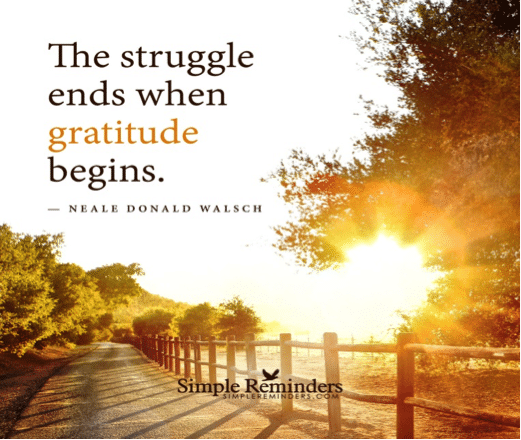Here we are again in a blink of an eye we are entering yet another holiday season with Thanksgiving just around the corner. It is interesting how family and holidays can add so much stress to our lives. We tend to worry about the decorations, preparation of a Thanksgiving meal, and expectations of personality clashes between Aunt Mary and Aunt May. The attitude of gratitude gets lost in translation of what every day should be like as we “count our blessings.”
One of the Thanksgiving traditions is sharing our testimony of some of the highlights of our life that are blessings which reflect our thankfulness. It doesn’t take long to go around the dinner table and ask each person to share something they are grateful for on this day.
Research on the benefits of gratitude has shown that expressions of gratitude can lead to happiness. Begin with the emotional center and looking at your life with gratitude. It will produce more relaxed, more good feelings, more content and produce happier memories. Socially you will find gratitude allows a deeper relationship, more relationships, and kindness. Your unique personality will find its strengths and may reflect a person who is less self-centered, less materialistic, more hopeful, and more spiritual.
As you continue to connect the dots from the emotional, social, and personality, you will see your health overall improve, i.e., improved sleep, increased energy, a strong immune system, and longer life. With improved health and a balanced life, you may notice your career and employment opportunities will improve in networking, solid decision making, and meeting work objectives for increased productivity. Gratitude aligns with thankfulness, and it is not as easy as it sounds without practice.
In many ways, the world of today with instant gratification has taken away some of our attention on being thankful. We have had the rapid fire of blessings to the point we take everything for granted. It is difficult in life to claim gratitude especially when we have suffered poor health or complex trauma, and it is too easy to get stuck in the victim role. The challenge is to be grateful for little things which will lead to being grateful for the results of living in a state of gratitude which will open your heart to a deeper purpose and meaning.
Overcome Addictions with Gratitude
The first step in finding joy and gratitude is to explore your life story and to bring to memory the things that came together to save your life which means that you have seen victory over the challenges in your life. Your testimony shines forth from the “telling of your story.”
When you can recognize the synchronicities that came together to give you “life breath” you will move out of the victim role and begin to see what have to be thankful for in life.
Sometimes gratitude will appear when we least expect it; at other times we choose to invoke it. For individuals who are willing to do a gratitude journal, it is a great tool to help to get “unstuck” from a place of victimhood find a place of giving and resilience.
If you are someone who uses your phone for more than just calling people you may want to download an app that will remind you to count your blessings. Just when you think that you are focused on being thankful daily you find yourself caught up in the matrix of daily living.
Ultimately it is in giving we receive and in gratitude you may honor all of the people who have come into your path to cheer you on.
Negative emotions will attempt to block your attitude of gratitude, just to name a few:
- Brokenhearted
- Defeated
- Hopelessness
- Dissatisfied
- Envious
- Guilty
- Humiliated
When we evaluate the things in our life that are provoking negative thought and negative emotions we lose sight of thankfulness. The good news is that when we choose mindfulness, we become in touch with our feelings by listening to our bodies.
When a person attempts to cover up the pain and suffering with drugs or alcohol, then even the blessings get lost in translation, and the individual is unable to meet their life challenges. The cycle gets stuck in what I like to call, “a cycle of contamination,” wherein, pain (emotional or physical) leads to feelings of hopelessness. The feelings of hopelessness can lead to a desire to use substances again to attempt to numb the pain.
I heard a story about a blind woman who was sitting on a dirt road with no sign of food or water.
A missionary approached her and asked her, “Is there anything we can do for you.”
She responded, “Please tell your church that Mary has everything she needs.”
Puzzled the missionary walked away feeling sad because she was so concerned about this older woman. Then she remembered a Bible verse that spoke of the Apostle Paul and one of the things he said when he was in prison, he said,
“I have learned to be content no matter what happens to me.” (Philippians: 4:11)
This was written in a letter when Paul was living in a Roman prison and had been beaten within an inch of his life. The true attitude of gratitude involves a presence of “being and trusting” in a divine source which allows life to happen for the highest good of all. When challenges come into your path is all part of an Earth journey which always has plenty of ups and downs and curves. This position of having an attitude of gratitude involves one of the positive emotions which is pure joy in knowing we have the power to look at the “glass half full.”
Below is a poem, written by Katherine Mansfield, which describes how sorrow can be turned into joy.
“If ‘suffering’ is not a repairing process,
I will make is so.
I will learn the lesson it teaches.
These are not idle words.
These are not the consolations of the sick.
Life is a mystery.
The fearful pain will fade.
I must turn to work.
I must put my agony into something,
Change it.
“Sorrow shall be changed into joy.”
It is to lose oneself more utterly,
to love more deeply,
to feel oneself part of life — not separate,
Oh, Life! accept me — make me worthy –teach me.”
This Thanksgiving and daily when possible, take the time to share your testimony about how an attitude of gratitude was able to help you reconcile with the truth of a particularly challenging situation which in the end allowed you to meet it and transform your experience of it with wisdom and love. It takes courage and humility to be content in all things in life.
Cinthia McFeature, Ph.D.


